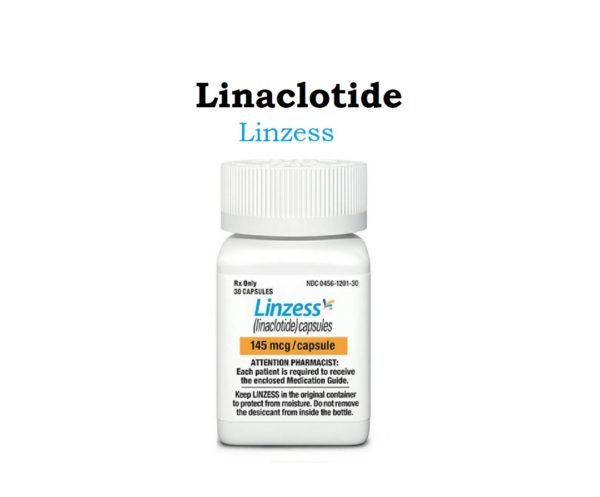Linaclotide (Linzess) is an orally available, non-absorbable medicine that acts on the intestinal lumen relieving the symptoms of constipation and visceral pain.
Linaclotide (Linzess) Indications:
-
It is indicated in adult patients for the treatment of:
- chronic idiopathic constipation in adults.
- Irritable bowel syndrome with constipation (IBS-C):
Linaclotide (Linzess) dose in Adults:
Linaclotide (Linzess) Dose in the treatment of chronic idiopathic constipation (CIC):
- 145 mcg orally once a day.
- A lower dose of 72 mcg once a day may be used in some patients based on the presentation and tolerability.
Linaclotide (Linzess) Dose in the treatment of Irritable bowel syndrome with constipation (IBS-C):
- 290 mcg orally once a day.
Linaclotide (Linzess) use in Children:
The safety and efficacy of the drug in children have not been established.
Pregnancy Risk Category: N (not assigned)
- Infant drug exposure is much less likely because the drug has low systemic absorption.
Linaclotide can be used during breastfeeding
- When administered in the recommended doses, the drug and its activemetabolites are not absorbed.
- It is unknown whether the drug will be excreted into breastmilk.
- Manufacturers recommend weighing the risks to the infant and the benefits to the mother when considering treatment.
Linaclotide (Linzess) dose in kidney disease:
- Adjustment in the dose in not necessary.
Linaclotide (Linzess) dose in liver disease:
- Adjustment in the dose in not necessary.
Common Side Effects of Linaclotide (Linzess):
-
Gastrointestinal:
- Diarrhea
Less Common Side Effects of Linaclotide (Linzess):
-
Central Nervous System:
- Headache
- Fatigue
-
Endocrine & Metabolic:
- Dehydration
-
Gastrointestinal:
- Abdominal Pain
- Flatulence
- Abdominal Distension
- Viral Gastroenteritis
- Severe Diarrhea
- Dyspepsia
- Fecal Incontinence
- Gastroesophageal Reflux Disease
- Vomiting
-
Respiratory:
- Upper Respiratory Tract Infection
- Sinusitis
Contraindications to Linaclotide (Linzess):
- Allergic reactions to the drug or any component of the formulation
- Pediatric patients less than 6 years of age
- patients with a known or suspected mechanical gastrointestinal obstruction.
Warnings and Precautions
- Diarrhea:
- Linaclotide may cause diarrhea that may be associated with volume loss if severe.
- Diarrhea may be more severe if the drug is taken with a high-fat meal.
- Patients may develop syncope, dizziness, hypotension, and electrolyte abnormalities (hyponatremia and hypokalemia) that may require hospitalization.
- In severe cases, treatment should be discontinued and the patient should be resuscitated with intravenous fluids.
Monitor:
IBS-C (IBS with predominant constipation):
- Monitor for abdominal pain,
- Bowel movements
- Quality and frequency of bowel movements
CIC (chronic idiopathic constipation):
- Frequency of spontaneous bowel movements
- Quality of bowel movements
- Frequency of straining during bowel movements.
How to administer Linaclotide (Linzess)?
- You should swallow the capsule whole. You should take the capsule on an empty stomach.
- It is best to do this at least 30 minutes before eating. High-fat meals can cause severe diarrhea or dehydration.
- Individuals who are unable to swallow the capsule whole can open it and mix the contents in water or applesauce.
- They can then administer the medication orally or through a nasogastric tube.
Administration of the drug in applesauce
- Take 1 teaspoon (5 mL) of the contents from the capsule.
- All contents must be taken in one go. The beads should not ever be chewed or stored for future uses.
Water is used for the administration of the drug
- Place the contents of 1 capsule in a cup of 30ml water. Boil and cool to room temperature.
- Mix the mixture for 20 seconds. Then, drink it immediately. Mix 30 ml more water and swirl the mixture.
- It is not recommended to store the mixture for future use.
Notice:
The drug is embedded on the beads' surface. The drug is not required to be dissolved in its entirety.
Linaclotide can be administered via a nasogastric tube or gastric feeding tube.
- Mix the contents of the capsule in 30ml water. Boil the water and let it cool to room temperature.
- Mixture is gently stirred for 20 seconds, and then aspirated using the feeding syringe. Use a steady pressure to force the beads-water mixture into a tube.
- You can repeat the procedure by adding 30 ml more water to any beads that are still in tact.
- After the administration of the drug, the nasogastric/gastric tube should be flushed in warm water with at least 10ml.
Notice:
You don't have to dissolve all beads and flush them through a tube in order to get the entire dose.
Mechanism of action of Linaclotide (Linzess):
- Linaclotide, along with its active metabolites, bind to and activate Guanylate Cyclose-C at the luminal surface the intestinal epithelium.
- This causes an increase in intracellular and extracellular levels of cyclic Guanosine monophosphate (cGMP), which results in chloride and bicarbonate efflux to the intestinal lumen.
- The result is an increase in GI transit.
- The increase in extracellular cGMP can also reduce visceral pain through reducing pain-sensing neuro activity.
Systemic Absorption
- It is very low. Plasma concentrations cannot be measured at the recommended doses.
Metabolism:
- The active metabolites are formed within the GI tract. By proteolytic degrading, the metabolites and parent drug are converted to smaller peptides or amino acids in the intestinal lumen.
Excretion:
- Primarily feces (3% to 5%; as the active metabolite)
International Brands of Linaclotide:
- Linzess
- Constella
Linaclotide Brand Names in Pakistan:
No Brands Available in Pakistan.







